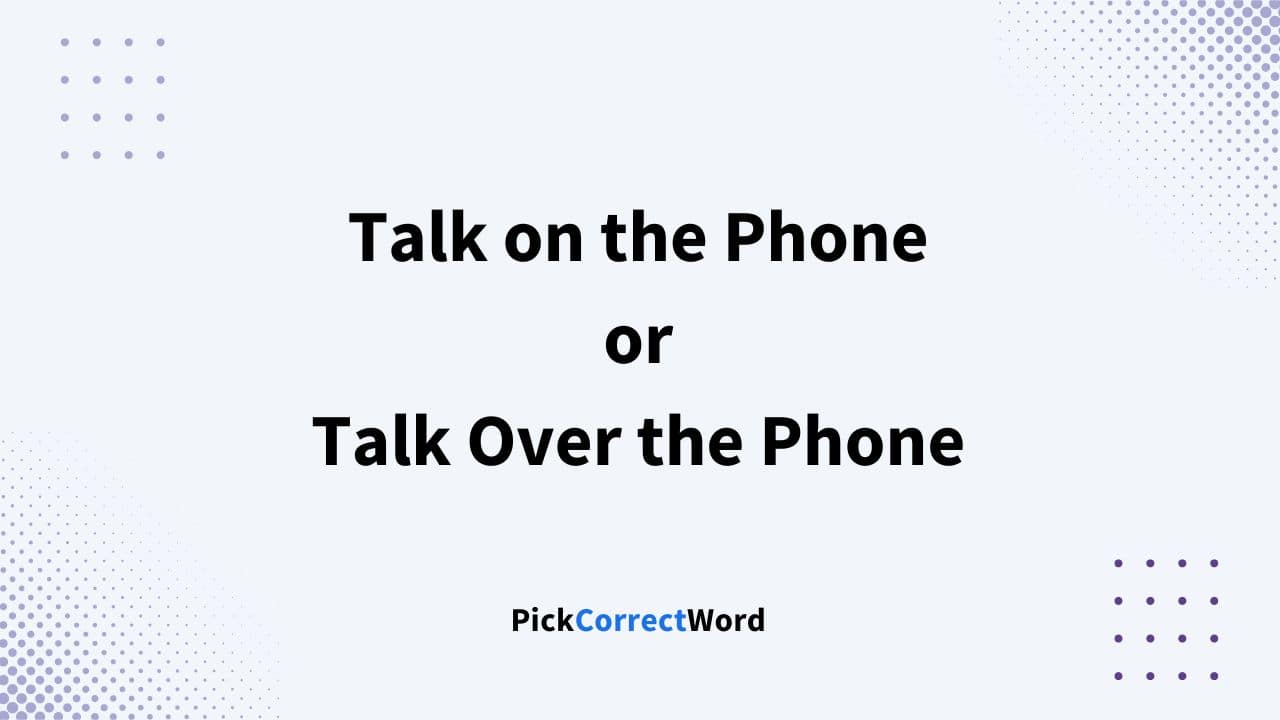Ever wondered how to correctly say you’re chatting using a phone – is it talk on the phone or over the phone? Both phrases mean you’re chatting through a phone, but there’s a tiny difference.
“Talk on the phone” is the phrase you’d usually use for simply having a chat using a phone. You can think of it as your regular phone call.
On the other hand, “talk over the phone” is used when you’re having a discussion that you would have preferred to have in person, but you’re doing it through a phone because of certain situations.
Both ways of saying it are correct, but depending on what your conversation is about, one might be a better fit than the other.
Talk on the Phone or Over the Phone: Which is Correct?
Both “talk on the phone” and “talk over the phone” are correct but they mean different things.
When you say “talk on the phone,” you’re just talking about using a phone for a chat. It means that you’re having a conversation using a phone.
But when you say “talk over the phone,” it can mean a situation where you would have liked to talk face-to-face, but because of some reasons, you’re talking through a phone instead.
Prepositions: On/Over in the Context of Phone Calls
The prepositions “on” and “over” help show the connection between what you’re doing and how you’re doing it – in this case, using the phone.
When you say “on the phone,” you’re saying that you’re directly involved in an activity that needs a phone.
When you say “over the phone,” it can highlight the phone as a link between people talking.
Using “On the phone“
When you see the phrase “on the phone,” you are typically dealing with someone who is in the midst of a telephone conversation. It’s a straightforward expression that applies to both making and receiving calls.
This phrase focuses on the telephone as the medium through which communication occurs. It implies that you are currently using that medium.
Using “Over the phone“
The phrase “over the phone” is about any action or chat that happens through the phone network. It highlights how you’re connecting, not the gadget itself.
When you say you talked with someone over the phone, you’re showing how the chat happened: through the phone system instead of face-to-face or some other way.
It uses the word “over,” which in this situation means the method of communication. You can think of it as another way of saying ‘via.’
Examples of using “on the phone” in a sentence
“I was on the phone with my bank, sorting out some transaction issues.”
“Can you take a message? I’m on the phone with a customer right now.”
“She spends hours on the phone gossiping with her friends.”
“I heard the news while I was on the phone with John.”
“I can’t talk right now, I’m on the phone with my boss.”
Examples of using “over the phone” in a sentence
“I confirmed my appointment with the doctor over the phone.“
“She broke up with him over the phone, which he thought was very impersonal.”
“We managed to resolve our differences over the phone.“
“I placed an order for the new book over the phone.“
“He offered me the job over the phone, and I immediately accepted it.”
Frequently Asked Questions
In what context should ‘on the phone’ be used?
‘On the phone’ typically refers to the act of being engaged in a telephone call. For example, you might say, “Please do not interrupt while I’m on the phone,” indicating that you are in the midst of a call.
What does the phrase ‘available over the phone’ mean?
When someone is ‘available over the phone’, it means they can be reached and are ready to communicate or provide assistance through a telephone call.
When discussing information, which is preferred: ‘discussed on the phone’ or ‘discussed over the phone’?
Both ‘discussed on the phone’ and ‘discussed over the phone’ are generally accepted. However, ‘discussed over the phone’ is generally considered more acceptable.


